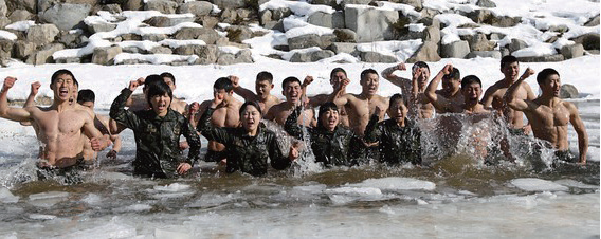
One well-known Korean joke is that one of the worst topics of conversation with women is playing soccer in the military. A majority of Korean women have no interest in the military and do not really care what happens there. However, big change has come and they have started to become greatly interested in it. Some women are making Gundaerria, the Korean army burger and Vanilla Latte, the Korean army beverage. What has brought about this fascination with military culture?


Military Quickens its Heartbeat
Recently, Korea has been tossing and turning over the big tragedies inside the military. Some may say that it is nothing new, but recently, there are more and more negative feelings towards the military, regarding it as a profession to avoid. This notion is deeply entrenched not only with males but also females who are mothers, sisters, and girlfriends. Despite the midst of misfortune, women’s stereotypes are slowly collapsing. They have started to regularly take part in male conversations about military.
The TV program, ‘Real Man’ was a big hit portraying the military realistically, and according to NilsonKorea , a 19.8% rating was recently recorded.1 With its popularity, the program shows the various aspects of the military. Remarkably, the gender ratio of the audience was 60% female and 40% male, which means women are showing greater interest than males.2 Also, thanks to the attention placed on military culture, so-called military food is selling like hot cake. The food was mainly eaten by and known among males, but nowadays females are curious and are enjoying it even though they know it isn’t healthy.
Their keen attention does not end here. Nowadays, women are not only focusing on the culture content of military culture but also actively discuss related topics even before men bring up the subject. So to say, there is a notable increase in the number of female writers who are choosing the military as their subject matter. Female novelist Lee Hyunsoo was nominated for the Dong-in Literary Award for her work, ‘Four Days,’ which describes the military during the Korean war, and writer Jeong Youjeong’s novel ‘28,’ which also deals with the military became a bestseller as soon as it was published. Surely, there were female writers who wrote about wars; however, they are now widening the scope of their works to include military issues. They are approaching these topics quite carefully by getting help from experts since they didn’t have any opportunity to experience real military culture. It shows that society has changed. In this way, rather than avoiding military topics, women are heading the military stories.

Diagnosis for the Burning Interest
What has made women show such great interest? It might be the result of increased opportunities of indirect military culture experience that has brought about sympathy. These days, there are lots of programs dealing with military culture through differentiated mass media content compared to the past. Even though there have been lots of entertainment programs about the military since the 1990s, they were mostly watched by males. However, several programs such as ‘Real Man’ and ‘Blue Tower’ are catching female audiences’ eyes. In this regard, Kim Minjong, Program director of ‘Real Man’ said, “I thought it would be eye opening to observe how young men struggle in the military and inform the public just as to what the military does, which is typically hidden from women, through a star-studded cast.”3 In this way, men no longer tell military stories from male perspectives. Instead, there are ample means for women to understand men’s culture. For instance, programs highlight impressive camaraderie or sometimes let viewers to feel their love for family by showing soldiers wiping their tears alone as they read their parents’ consolatory letters. Moreover, some programs elaborate on jargon or technical terms used in the military so that females can comprehend the alien words. Lee Nahyun, Keimyung University School of Medicine '12 said “Whenever I watch Henry pouts after losing his empty cartridge or Sam expresses delight eating Gundaerria, I feel like I am right there inside the military. I always thought the military was heavy and closed but nowadays it is much more attenuated.”
Not only are there more chances for women to encounter a new culture, the change to female psychological thought has entered into society and its social attributes are clear. By entering the workforce, women have started to complain about the culture of rank, which aroused antipathy from males as well. This malaise evoked a strong desire to ease an exhausted mind and body by belonging to a bigger social group such as the military. A critic of popular culture, Hae Jaegeun explained, “During the great depression, young Germans were infatuated by the uniform of the Nazis. Whenever people sense instability or insecurity in terms of a social or economic situation, nationalism rises. When one’s workplace cannot protect individuals and schools or family communities collapse, helpless people long for a large social group. In this sense, one of the most favored groups is the military.”4 In this way, the military has exceeded its image of a male training center or preparatory place for war. It is now a haven for women wanting to relieve their fatigue due to stress in society. Although a majority of women do not actually have any obligation to serve in the military, women are becoming more and more informed through indirect military experiences.


More than Just Fun
For a long time, there has been constant conflict between females and males over whether Korean society should give extra points to a person who served in the military when they find jobs or get official jobs, or whether to impose the same obligation to serve on women. This conflict is an age-old battle without any solution or countermeasure. Ko Seonju at the Korea Institute for Health Family advised, “Conflict between the genders is very destructive. It is easier to desert a couple relationship than other types of relationship such as that of a parent and a child. Thus, more caution is required.”5 Fortunately, women are paying attention to male culture, so the military can be a prescription for society’s problems since they can understand or sympathize with males. Surely, one cannot deny male's effort on spreading their own culture. By considering others’ perspectives, there will be less senseless arguments about military issues. Eventually, this can be the foundation for realizing social integration. To sum up, women’s enthusiasm towards the military, supported by men’s society can be a ladder to reach a society ripe for change.
Another significance of this phenomenon is that there is room for improvement of the chronic problems of the military, which are cancers that society must remove. There was a shocking report saying that 70% of the military dead were soldiers who committed suicide.6 Distrust among people is rampant in Korean society. However, men are now serving alongside women troops. Hence, when men struggle with issues, such as protection of soldiers’ human rights, women would be more likely to understand them and throw themselves into the conversations voicing strong opinions. Women no longer limit their problems but consider both genders. They can point out irrationalities of the military society and empower or support the military culture, taking a major step toward a healthier society.

Harmony is Two Hearts Beating as One
Thanks to the opportunities of indirect experience which interlock women advancing in society and changes within the female group identity, women are listening carefully to male voices and observing their culture. However, some critics argue that those indirect experiences only cause unrealistic disillusion; not every solider acts, thinks, or speaks like how they are portrayed in books or on television programs, and this hinders true understanding. Despite these concerns, it is crystal clear that changes can be a crucial source of Korea’s social integration and positively affect chronic problems in the army. The day has passed when cries for gender equality or social unification came from asserting gender clichés. Based on these changes, society should take more powerful steps towards a mature society. Furthermore, as females have started to hear men’s voices, let’s hope males will start to open their ears to women stories within the support of women.
1 Geum Bitna, “Changing members, ‘Real Man’ Features New Soldiers, Will it Bring New Winds,” MBN, September 23, 2014
2 Park Miae, “[Real Man] Everyday Upward Trend.. Even Women like Military Stories,” Edaily, June 30, 2013
3 See Footnote 1
4 Kang Jooil, “Rising Sympathy: a Military Entertainment Program on a Dry and Tough Life,” The Kyunghyung Shinmun, April 23, 2013
5 Ko Seonju, “Confilct between Different Genders is More Destructive than Generation Discord in Family,” Women news May 6, 2013
6 Choi Yoonshin, “Looking Back on Our Military on Armed Forces Day… Annual death of 195 people, 70% of them Committed Suicide,” MoneyWeek, October 1, 2014


